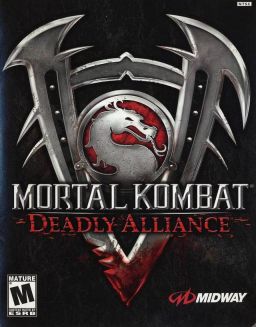Mortal Kombat: Tournament Edition
| Mortal Kombat: Deadly Alliance | |
|---|---|
 |
|
| Developer(s) | Midway Games |
| Publisher(s) | Midway Games |
| Director(s) | Ed Boon |
| Producer(s) | John Podlasek Paulo Garcia Brian LeBaron |
| Designer(s) | Ed Boon |
| Programmer(s) | Michael Boon Jon Greenberg Jay Biondo |
| Artist(s) | Tony Goskie Steve Beran Herman Sanchez |
| Writer(s) | John Vogel Alexander Barrentine |
| Composer(s) |
Dan Forden Rich Carle Vince Pontarelli Eric Huffman |
| Series | Mortal Kombat |
| Engine | RenderWare |
| Platform(s) | GameCube, PlayStation 2, Xbox, Game Boy Advance |
| Release date(s) |
PlayStation 2 GameCube Xbox Game Boy Advance
|
| Genre(s) | Fighting |
| Mode(s) | Single-player, multiplayer |
| Aggregate scores | |
|---|---|
| Aggregator | Score |
| GameRankings | PS2: 81.90% GCN: 81.82% Xbox: 82.60% GBA: 84.63% |
| Metacritic | PS2: 79 GCN/Xbox/GBA: 81 |
| Review scores | |
| Publication | Score |
| GameSpot | PS2/GCN/Xbox: 8.1/10 GBA: 7.9/10.0 |
| GameSpy | PS2/GCN/Xbox: 4/5 |
| IGN | PS2/GCN/Xbox: 8.6/10 GBA: 8.8/10 |
Mortal Kombat: Deadly Alliance is a fighting video game developed and published by Midway for the Xbox (not compatible with Xbox 360), PlayStation 2, GameCube, and Game Boy Advance. It was the first all-new Mortal Kombat fighting game produced exclusively for home consoles, with no preceding arcade release. Deadly Alliance is chronologically the fifth main game in the Mortal Kombat series. Its story focuses on the titular alliance between sorcerers Quan Chi and Shang Tsung and their schemes to revive an ancient army to conquer Outworld and Earthrealm.
Two different Game Boy Advance games based on Deadly Alliance were released. The first version, also titled Mortal Kombat: Deadly Alliance was released on November 2002, during the same week as the home console versions, while the second GBA version, Mortal Kombat: Tournament Edition (originally titled Mortal Kombat: Deadly Revenge, which was printed in the manual), was released on August 25, 2003.
Like all of the Mortal Kombat games, Deadly Alliance focuses heavily on its fighting modes. The gameplay is completely different from that of previous entries in the franchise. Each character now possesses three individual fighting styles, generally two hand-to-hand styles and one weapon style (excepting Blaze and Mokap, who received three hand-to hand styles and no weapon style) which players can switch between with the push of a button. In previous games, aside from "dial-a-combos" all the characters fought virtually identically, with only special moves to differentiate them. The number of special moves per character (usable in any fighting style) has also been reduced, varying only from two to four for most, thus forcing the player to make use of the improved fighting system. The characters can no longer run, and there is no run meter. However, while still limited to only moving into the background and foreground, movement in the third dimension is much easier and can be used continuously (in Mortal Kombat 4, sidestepping was mapped to two different buttons and could be performed at a rate of about one a second). To prevent fighters from leaving the arena, boundaries that are otherwise invisible appear when a fighter is knocked against the edge.
...
Wikipedia
